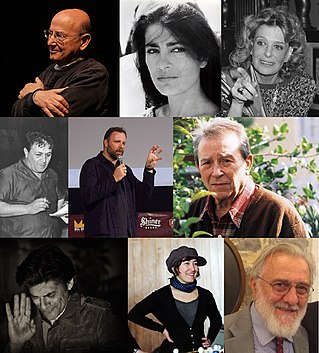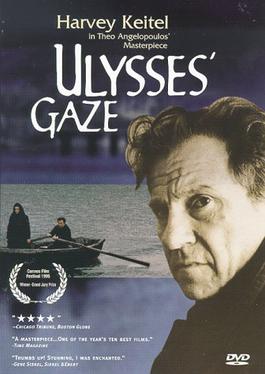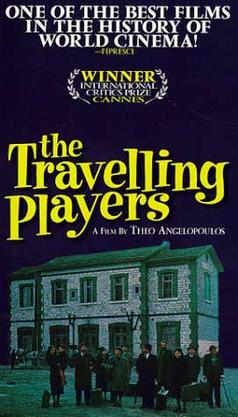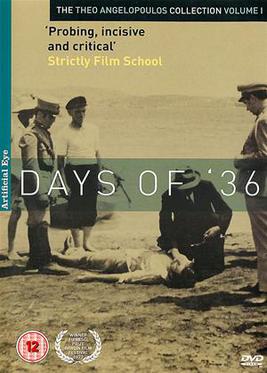
The Ethniki Organosis Kyprion Agoniston was a Greek Cypriot nationalist guerilla organization that fought a campaign for the end of British rule in Cyprus, and for eventual union with Greece.

Georgios Grivas, also known by his nickname Digenis, was the Cypriot founder and leader of the Greek and Greek Cypriot paramilitary organisations Organization X (1942–1949), EOKA (1955–1959) and EOKA B (1971–1974).

Cyprus was part of the British Empire, under military occupation from 1914 to 1925, and a Crown colony from 1925 to 1960. Cyprus became an independent nation in 1960.

The cinema of Greece has a long and rich history. Though hampered at times by war or political instability, the Greek film industry dominates the domestic market and has experienced international success. Characteristics of Greek cinema include a dynamic plot, strong character development and erotic themes. Two Greek films, Missing (1982) and Eternity and a Day (1998), have won the Palme d'Or at the Cannes Film Festival. Five Greek films have received nominations for the Academy Award for Best Foreign Language Film.

The Turkish invasion of Cyprus began on 20 July 1974 and progressed in two phases over the following month. Taking place upon a background of intercommunal violence between Greek and Turkish Cypriots, and in response to a Greek junta-sponsored Cypriot coup d'état five days earlier, it led to the Turkish capture and occupation of the northern part of the island.
Derviş Zaim is a Turkish Cypriot filmmaker and novelist, who has twice won the Golden Orange for Best Director for Elephants and Grass (2000) and Dot (2008); Golden Oranges for Best Film and Best Screenplay for Somersault in a Coffin (1996); and the Yunus Nadi literary prize for his debut novel Ares in Wonderland (1995).

Ulysses' Gaze is a 1995 Greek war drama film directed by Theo Angelopoulos, and starring Harvey Keitel, Maia Morgenstern and Erland Josephson. It is loosely based on Homer's epic poem Odyssey.
EOKA-B or Ethniki Organosis Kyprion Agoniston B was a Greek Cypriot paramilitary organisation formed in 1971 by General Georgios Grivas ("Digenis"). It followed an ultra right-wing nationalistic ideology and had the ultimate goal of achieving the enosis (union) of Cyprus with Greece. During its short history, the organisation's chief aim was to block any attempt to enforce upon the Cyprus people what the organisation considered to be an unacceptable settlement to the Cyprus issue. In addition, the organisation drafted various plans to overthrow President Makarios. The organisation continued its activities until it officially declared its dissolution and disbanded on 11 February 1978.
Attila '74: The Rape of Cyprus is a 1974 documentary film by Michael Cacoyannis about the Turkish invasion of Cyprus in 1974. It was filmed on location in Cyprus and Greece in the immediate aftermath of the two Turkish invasions and subsequent occupation of approximately the northern third of the island.

Kythrea is a small town in Cyprus, 10 km northeast of Nicosia. Kythrea is under the de facto control of Northern Cyprus.

The São Paulo International Film Festival, also known internationally as Mostra, is an annual film festival held in the city of São Paulo, Brazil. A non-profit event, the festival is organized by ABMIC. The state and city of São Paulo have established October as the festival's official month.

The Cyprus Emergency was a conflict fought in British Cyprus between April 1955 and March 1959.

The Travelling Players is a 1975 Greek historical drama film written and directed by Theodoros Angelopoulos that traces the history of mid-20th-century Greece from 1939 to 1952.
The mass media in Cyprus refers to mass media outlets based on the island of Cyprus, including both the Republic of Cyprus (RoC) and the Turkish Republic of Northern Cyprus (TRNC). Television, magazines, and newspapers are all operated by both state-owned and for-profit corporations which depend on advertising, subscription, and other sales-related revenues.
Cyprus International Short Film Festival, best known as International Short Film Festival of Cyprus (ISFFC) is an international film festival for short films held in Cyprus. The festival is also European Film Awards-qualifying for short films.

Agios Sozomenos is a deserted village in the Nicosia District of Cyprus, close to the Green Line and near Potamia. It is located at the confluence of the Alikos river with the Gialias, the second-longest river of Cyprus.
Panicos Chrysanthou is a Cypriot filmmaker and documentarian, who has won the Abdi İpekçi Peace Award for his film Our Wall.
Parallel Trips is a 2004 Cypriot documentary film, written, produced and directed by Derviş Zaim and Panicos Chrysanthou, in which the two directors, from opposite sides of the divided island of Cyprus, record the human dramas that unfolded during the war of 1974 and the legacy that remains today. The film was screened at the Istanbul International Film Festival and the 12th London Turkish Film Festival.

Days of '36 is a 1972 Greek dramatic independent underground art film directed by Theo Angelopoulos. Its title is a tribute to Constantine P. Cavafy.












